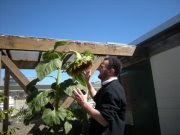*** Possible potential heresy warning ***
Over on his blog,
Dovbear asks what an Orthodox Jew is supposed to do with the story of Noah and the flood. He provides several answers, and to be honest, none of them are totally satisfactory.
I would add another difficulty to the story, which is the great similarity of the wording to the
Epic of Gilgamesh. In the words of
James Kugel:
the Bible’s Flood story is nowadays generally held to be a recasting of an ancient Mesopotamian legend – one that even retains some of the original wording (“smelled the pleasing odor” and so forth) of the text from which it was copied
(If you look in his book "How to Read the Bible" he discusses this in greater detail)
In other words, not only is there a lot of evidence that the flood did not actually take place as reported in the Torah, but it also looks as though the 'author' of the Torah copied and pasted from the earlier Epic.
I wonder (and I'n not sure if this is heretical or not) whether Rashi provides us with an answer to solve these issues. In Gittin there is an argument between Rabbi Yochanan and Reish Lakish as to how the Torah was given to Moshe Rabbeinu.
א"ר יוחנן משום רבי בנאה תורה מגילה מגילה ניתנה שנא' אז אמרתי הנה באתי במגילת ספר כתוב עלי ר"ש בן לקיש אומר תורה חתומה ניתנה שנאמר לקוח את ספר התורה הזאת
R. Johanan said in the name of R. Bana'ah: The Torah was transmitted in separate scrolls, as it says, Then said I, Lo I am come, in the roll of the book it is written of me. R. Simeon b. Lakish said: The Torah was transmitted entire, as it says, Take this book of the law.
(Tosefot points out, quoting from Rashi's commentary on Chumash, that Reish Lakish also agrees with Rabbi Yochanan's basic premise that the stories were given independently. The argument between them is whether they were given in the order in which they were to be written, or in a different order, and were later compiled into the order in which they appear in the Torah)
תורה חתומה ניתנה. תימה דכתיב (שמות כד) ויקח ספר הברית ויקרא באזני העם ופרש"י בפי' חומש דהיינו מבראשית ועד כאן ונראה לפרש דלא קאמר חתומה ניתנה שלא נכתבה עד לבסוף אלא שעל הסדר נכתבה דיש פרשיות שנאמרו תחילה לפני אותם הכתובים לפניהם ולא נכתבה עד שנאמר לו אותה שכתובה לפניה וכותב זאת אחריה
Rashi there expains Rabbi Yochanan's view:
כתוב עלי. מאז ניתנה התורה הוזכרתי בה ואת שתי בנותיך הנמצאות (בראשית יט) בזכות דוד שעתיד לצאת מרות המואביה ונעמה העמונית אמו של רחבעם כתיב הכא הנמצאות וכתיב התם (תהלים פט) מצאתי דוד עבדי אלמא מגילה איקרי משום דמתחילה נכתבה מגילת בראשית והדר מגילת נח והדר מגילת אברהם והיינו דקאמר במגילת אברהם כתוב עלי:
... First the 'Scroll of Genesis' was written,then the 'Scroll of Noach', then the 'Scroll of Avraham'...
Here is my question - why did Rashi not simply explain (based on his own commentary on chumash cited by Tosefot above) that the entire book of Bereishit and the beginning of Shemot were given to Moshe at once. And the argument between Rabbi Yochanan and Reish Lakish is only about the remainder of the Torah - whether it was given at once, or piecemeal.
Rashi specifies that before the Torah was actually written there was something called 'Scroll of Genesis' etc. Is it possible that G-d told Moshe to take existing stories from other the ancient world, and transform them into Torah through editing etc. Everything that happens in the world is ultimately from G-d, so the fact that these stories may have originally been written in other mythologies does not mean that they do not contain an element of G-dly truth.
Perhaps Moshe was told by G-d to take certain ideas from the Epic of Gilgamesh, and other works, which teach us ultimate and eternal truths, (and obviously to discard those parts which are not true). This would explain the similarity of wording between the Torah and the Epic.
We know that there were earlier works which the Torah expects us to be familiar with. for example, Bamidbar 21:14 states:
עַל-כֵּן יֵאָמַר בְּסֵפֶר מִלְחֲמֹת ה': אֶת וָהֵב בְּסוּפָה וְאֶת הַנְּחָלִים אַרְנוֹן
wherefore it is said in the book of the Wars of the LORD: Vaheb in Suphah, and the valleys of Arnon
There is also mention of
Sefer HaYashar and others.
And if you will grant me that G-d told Moshe to copy and edit earlier texts - is it possible that the key thing from those texts was the ethical/moral message? Perhaps the historicity of the event was irrelevant to G-d and Moshe. Perhaps the fact that people were aware of this myth, and it became part of Torah, was sufficient. Whether it 'actually' happened the way it was written or not may not be the issue that G-d was concerned with.
It seems to me that if someone does not believe that there was a literal (whatever that means) revelation at Sinai they are putting themselves outside the traditional faith of Judaism. But perhaps Rashi in Gittin (and the gemara itself) is alluding to the fact that the earlier parts of the Torah are based on other texts, and only became 'the word of G-d' once G-d told Moshe to put them into the Torah.
What do you think? Is this a valid reading of the gemara/Rashi? Does it help to answer the flood questions? And is it heresy?

